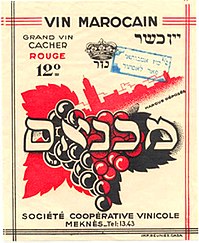 Kosher wine label from 1930 | |
| Halakhic texts relating to this article | |
|---|---|
| Torah: | Deuteronomy 32:38 |
| Mishnah: | Avodah Zarah 29b |
| Babylonian Talmud: | Avodah Zarah 30a |
Kosher wine (Hebrew: יין כשר, yáyin kashér) is wine that is produced in accordance with halakha, and more specifically kashrut, such that Jews will be permitted to pronounce blessings over and drink it. This is an important issue, since wine is used in several Jewish ceremonies, especially those of Kiddush.
To be considered kosher, Sabbath-observant Jews must supervise the entire winemaking process and handle much of it in person, from the time the grapes are loaded into the crusher until the finished wine product is bottled and sealed. Additionally, any ingredients used, including finings, must be kosher.[1] Wine that is described as "kosher for Passover" must have been kept free from contact with leavened or fermented grain products, a category that includes many industrial additives and agents.[2]
When kosher wine is produced, marketed, and sold commercially, it would normally have a hechsher (kosher certification mark) issued by a kosher certification agency, or by an authoritative rabbi who is respected and known to be learned in Jewish law, or by the Kashruth Committee working under a beth din (rabbinical court of Judaism).
In recent times, there has been an increased demand for kosher wines, and a number of wine-producing countries now produce a wide variety of sophisticated kosher wines under strict rabbinical supervision, particularly in Israel, the United States, France, Germany, Italy, South Africa, Chile,[3] and Australia. Two of the world's largest producers and importers of kosher wines—Kedem and Manischewitz—are both based in the American Northeast.
- ^ T. Goldberg "Picking the perfect Passover wine" MSNBC, April 19th, 2004.
- ^ Cite error: The named reference
Oxford p 383was invoked but never defined (see the help page). - ^ "Chile produces kosher wine". Wine Spectator. Retrieved 6 December 2015.